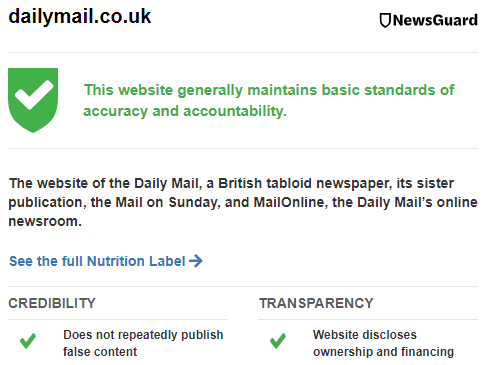
US news website rating tool Newsguard has changed its verdict on Mail Online after originally declaring the UK’s most-read news website failed to uphold “basic standards of accuracy or accountability”.
Newsguard now says the website “generally maintains basic standards of accuracy and accountability”. The start-up said the changes had been made following “discussions” with an unnamed Daily Mail executive
New York-based Newsguard runs a free extension for the Google Chrome and Microsoft Edge browsers that dishes out “red” and “green” ratings to news websites based on its judgement of their trustworthiness.
It was revealed last week that the ranking tool, which is included as an opt-in extension on Microsoft Edge’s mobile web app, handed Mail Online a red rating that put it on par with Kremlin-backed newsbrands RT and Sputnik.
When the browser extension is installed, red or green shields appear to give Newsguard’s appraisal of the website, which it calls “nutrition labels”.
In its previous “red” rating for Mail Online, Newsguard claimed it failed on six counts:
- To gather and present information responsibly
- Handle the difference between news and opinion responsibly
- Avoid deceptive headlines
- Reveal who is in charge and potential conflicts of interest
- Provide the names of content creators with contact information
- Repeatedly published false content.
In its new “green” label for the website, Newsguard has rowed back on its previous claims about deceptive headlines, publishing false content and the failure to reveal who is in charge along with conflicts of interest.
It still regards Mail Online as failing to gather and present information responsibility, handle the difference between news and opinion responsibly and provide the names of content creators with contact information.
In its editor’s note on the updated “nutrition label” for Mail Online, Newsguard said: “This label now has the benefit of the dailymail.co.uk’s input and our view is that in some important respects their objections are right and we were wrong, which we think demonstrates the value of the transparency and accountability that imbues what we do.”
Newsguard said the Daily Mail executive pointed out that it had relied too heavily on complaints filed with watchdog the Independent Press Standards Organisation when making a judgement on whether or not the site repeatedly published fake news.
Newsguard accepted that point and said it “should not be over-relying on IPSO’s process for our judgement on this criterion” and also needed to consider the number of IPSO complaints levelled at a publication against how much content it publishes.
Mail Online publishes some 1,500 stories per day – well over half-a-million per year. It has 12m average daily unique browsers, according to circulation auditor ABC.
The “red” ratings for deceptive headlines was reversed after Newsguard similarly considered the number of Mail Online stories that carried misleading headlines versus those that did not.
The Mail executive also challenged the media start-up’s claim that it failed to handle the difference between news and opinion responsibly, pointing out that UK newspapers “have long-held politically oriented viewpoints … and that this is a widely accepted practice in British journalism”.
Newsguard said it would not change Mail Online’s “red” rating on that criteria because there was no “disclosure of its conservative orientation” on its website.
The start-up said the Mail executive agreed with its point on revealing who was in charge and possible conflicts of interest and has put more information about editorial leadership on its website.
Newsguard has claimed more than 500 online news outlets have “improved their journalism practices” based on its nine trustworthiness factors, which are:
- Not repeatedly publishing false content
- Gathering and presenting information responsibly
- Regular corrections and clarifications (where necessary)
- Handling the difference between news and opinion responsibly
- Avoiding deceptive headlines
- Disclosing ownership and source(s) of financing
- Clearly labels advertising
- Reveals who is in charge and any conflicts of interest
- Provides name of content creators with either contact or biographical information.
It said that Mail Online, Reuters and Yahoo News are among those that have improved practices as a result of its browser extension.
Newsguard co-chief executive Steven Brill said: “We created Newsguard because we believe strongly that when news organizations are held to a high standard of accuracy and accountability, the result is good for both those news organizations and their readers.
“Our results thus far show that this is indeed the case. The most common side effect of what we do is for news organisations to improve their journalistic practices.”
Newsguard ratings are calculated by a leadership and analyst team that includes alumnus from The Week, the Wall Street Journal and the Associated Press.
Microsoft partnered with the firm in August last year as part of its Defending Democracy Program.
Brill told Press Gazette that Newsguard has so far rated the 2,000 most read news and information websites in the US – and that some UK publications happened to appear in that bracket.
It rates website on a 0 to 100 points scale, with 60 being the threshold between “green” and “red” rankings.
Each of the nine trustworthiness factors are weighted differently, with reporting true and accurate stories gaining the most points at 22 and providing information on “content creators”, such as journalist bios, the least at 5 points.
Picture: Newsguard
Email pged@pressgazette.co.uk to point out mistakes, provide story tips or send in a letter for publication on our "Letters Page" blog
